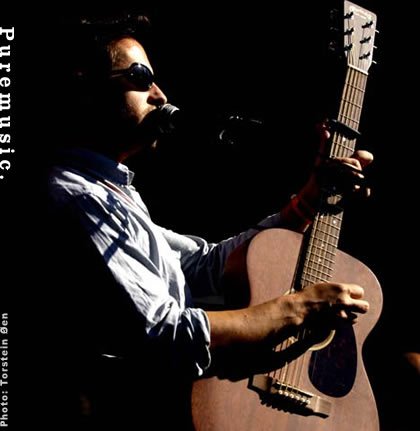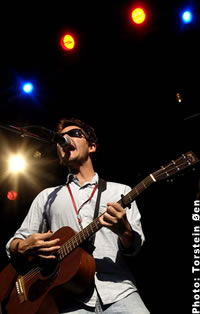
A Conversation with Josh Rouse (continued)
PM: Tell me if this is a ticklish thing at all, but to me, there's a certain Josh Rouse groove that I like a lot, that to me, is a really hip Al Stewart vibe.
JR: Yeah, yeah.
PM: It's a "Year of the Cat" thing.
JR: Yeah, I hear that.
PM: But when you do it, it's totally different.
JR: Yeah, well, I like Al Stewart a lot. And I think it kind of goes back to that, mixing the major and minor chords. And the melody--
PM: But he doesn't have your slant on things, your words, your melody, it's a different thing.
JR: Yeah, yeah. But I like that kind of moody stuff that he does. It always kind of--every time I hear "Year of the Cat," I really like it a lot. That's part of my sound.
[If you haven't heard this song in a while, or if you've missed it altogether (it was a hit exactly 30 years ago), here's a clip of it.]
PM: Yeah. And back then, and now, I mean, that's a sound that works.
JR: Yeah.
PM: And I dig that you're keeping that groove alive.
JR: Thanks. Yeah, it's cool because no one really does it. Everyone is into that kind of rock or rap thing, so maybe the punk thing now is what I'm doing.
PM: [laughs]
JR: It's like the rebellion against everything that's going on now in commercial music--the Arctic Monkeys, and all that stuff, you know.
PM: Right.
JR: I don't make those kinds of records, but it seems a lot easier to me to do that than--that kind of Al Stewart and even like that Fleetwood Mac, that requires a certain amount of musicianship to get those grooves right, and make it swing like that. I'm proud of that.
PM: Yeah, and I love it about your records. Who added the lead guitar lines, and who did the steel, and when?
JR: I did all the lead stuff. I played all the guitar on the record.
PM: Oh, that's great.
JR: Yeah, yeah. And Pete Finney, who lives there in Nashville, he plays pedal steel on the record.
PM: So Brad tracked that with Pete when he got back to town? [The ubiquitous Pete Finney, we call him. He just got the Dixie Chicks gig, I hear.]
JR: Yeah, and Chris Carmichael did the strings. [Chris shows up on various Brad Jones recordings as a string section, or sometimes a symphony.]
It was fun record to make. I'd just started my label, so I was paying for everything, Brad came over, and Mark [Pisapia, the drummer] was over because we were doing some touring. And we just spent ten days down in Puerto De Santa Maria, down in this guy's studio, his name is Paco Loco, and we had a great time. It had a pool, really laid back. We were kind of making a summertime record. And it was a perfect place to do that. It was August. And the weather was actually really nice. They get a nice breeze. They're down there by Africa, way down the in the south of Spain.
PM: Damn.
JR: And the studio was a lot of fun. Stuff was breaking down every now and then. It kind of had a cool semi third world vibe. I mean, all the equipment was fine. We had a Calrec board from 1967 and vintage mics that we used to mic everything. And Paco Loco was great. He's got a great little thing running down there.
PM: So is it a Protools rig, or--
JR: Yeah, yeah. We did it on Protools. And the mic cables are thirty years old, 1967, so he'd go in there and shake one--we'd be like, "Okay, Paco, we're not getting anything on this mic." And he go in there and shake it and he'd go, "Now? Now? Is it working now?"
[laughter]
JR: It had a nice atmosphere, and he kept us laughing. He is a real comedian. And he's kind of one of the bigger indie rock producers in Spain. He knew what I did.
PM: He was familiar with you.
JR: He had a lot of questions about touring, and just about my whole kind of thing. And Gary Louris from the Jayhawks was down there. He has a house down there. And he and Paco are best buddies.
PM: Really?
JR: Yeah. So Gary was around, and he had his family there. And so we'd eat outside. There'd be like twelve of us eating outside every night for dinner.
PM: Late, too, right?
JR: Yeah, yeah. It was just probably one of the best experiences I've had making a record.
PM: Damn. That sounds incredible...
JR: Yeah, it's nice to make them in Nashville, you got all the musicians around. But it's kind of nice to be isolated a little bit, too, and just use your resources, whatever you have.
PM: Yeah. Now, come on, that's a precious atmosphere to be recording in. That's unbelievable.
JR: Yeah, yeah.
PM: I think it's very interesting that at this point in time you go your own way. I guess the deal with Ryko ran its course.
JR: Yeah.
PM: And it's a good time to do your own label and at the same time license it through Nettwerk. It sounds like the best of all possible worlds, right?
JR: Yeah, it's going good. I'm pretty happy with it.
PM: They're a cool bunch, right?
JR: Yeah, it's great. They've got a really good team of people together. They're enthusiastic.
PM: And they're very hip. I mean, you look at the roster. I always like dealing with Nettwerk. And dealing with Emily Provansal in Publicity, that's been a real pleasure. She's great.
JR: Good to hear that.
PM: So what's the touring question like, without Ryko behind the thing? How does that play out?
JR: Great. I mean, I haven't had any real support from them for years.
PM: Oh, really? You've been on your own.
JR: Yeah, yeah. We do well enough on the road where it pays for itself. This year, because I was just starting out, I just--Mark and Hags are out with me, and we're just three-piecing it, which is great. And then we have string sections in some of the cities, which a nice.
PM: Wow.
JR: Yeah, like we did Town Hall in New York, and had a string section for that, and that was really beautiful show.
PM: And you just arrive with charts and cold call people, or how does it work?
JR: Chris at Nettwerk helps out. They find the string sections, like in L.A., New York, San Francisco, Seattle. They find the string sections. And Chris Carmichael made a bunch of charts for me. We just mail the charts to them. They show up. And it's usually pretty much like it is in New York: they knew it. I ran through it with them once, and it sounded great. And then we sound checked a little bit, and played the concert.
PM: Damn. How many strings will you use?
JR: A quartet, two violins, a cello, and a viola.
PM: Right, wow. So what about the Euro touring situation? Is that going to continue?
JR: Right after I finish these dates I got about a week and a half break, and then I'm up to Scandinavia and the UK, and Ireland. But Scandinavia is going really, really well. I think the record is in the Top Ten.
PM: Wow, that's exciting, man!
JR: They really get into it up there, yeah. I had a bunch of success with 1972, and then from there it's just kind of grown and grown. I think there's a lot of Norwegian and Swedish people in Spain, and I think because it's so cold up there they really dig a kind of summertime record. And I think this one really hit the spot for them.
PM: Yeah, it's a mysterious thing, this incredible vibe you get going on your records, and it's a really infectious thing. Every time you make a record I like it, without fail.
JR: Thanks Frank.
PM: Just really amazing. Well, you're busy. I'm going to hold it at that, man. I really appreciate you giving me some time today. Okay, well, regards to Paz, and Mark and Hags.
JR: Okay. I'll tell them you said hi. Great talking to you.
 |
|
| print (pdf) | |
| listen to clips | |
| buy his new CD here | |
| joshrouse.com | |
| nettwerk.com | |
| our previous j.r. interview | |
| alstewart.com | |
| puremusic home | |